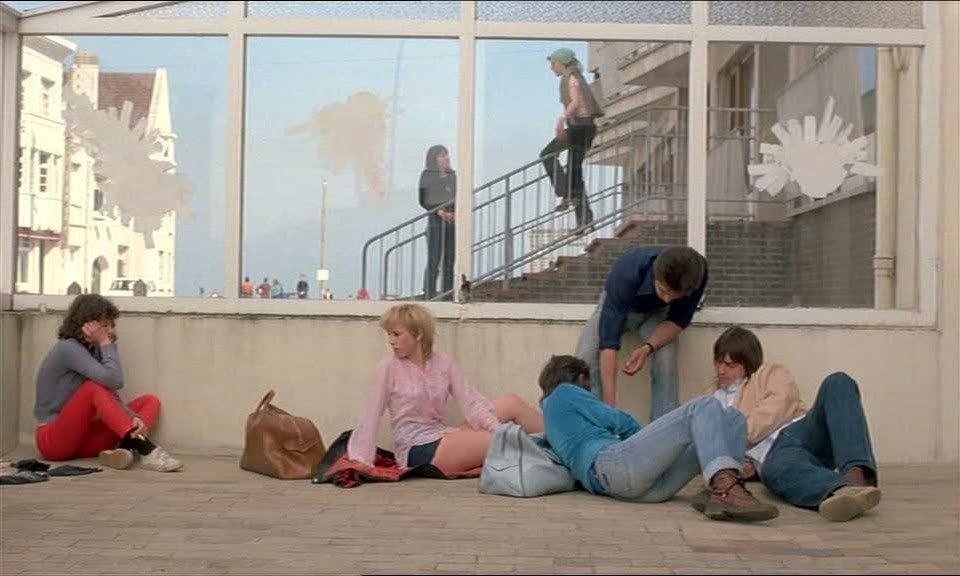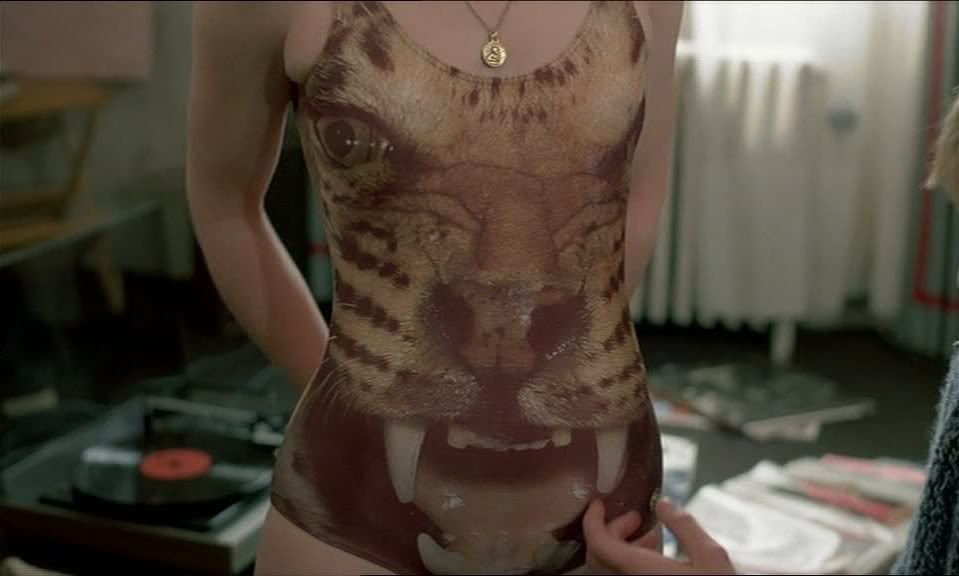
Maurice Pialat's Graduate First... is an incisive portrait of small town life for a group of young friends waiting to take the bac, the test that's necessary to get a degree and, in theory at least, greater job opportunities. In practice, this last ritual of youth seems like a formality, increasingly meaningless in an atmosphere where there are few jobs, few real opportunities, for these kids who have no idea what comes next. As usual, Pialat's offhand realism gives the impression of real intimacy with these characters; the cast is large, but each of these young people comes across as complex and vibrant, each coping in his or her own way with the frightening onset of supposed maturity, the end of youth marked by a portentous test, after which no one's quite sure what to do next.
Élisabeth (Sabine Haudepin) is well-known for going around with all the guys, but she finally settles down when she meets Philippe (Philippe Marlaud), who becomes her first "real" boyfriend. Bernard (Bernard Tronczak) is similarly promiscuous; he loves all the girls and sleeps with all of them, never quite letting go even after he's broken up with them. There's also Bernard's best friend Patrick (Patrick Lepcynski), who's always trying to smooth things over for his friend, and who's never quite able to get a girl of his own, and Patrick's sister Valérie (Valérie Chassigneux), who wants to be a model. There's also Agnès (Agnès Makowiak), one of Bernard's former girlfriends who clearly still loves him, and who he still feels real affection for, even though she's marrying Rocky (Patrick Playez) instead. It's the kind of circle of friends where everyone has slept with everyone and remains friends afterward. Pialat's observational style, lingering around the edges of these friendships and love affairs and loose groupings, captures the uncertainty of youth, the sense that these young people are making decisions that will affect the rest of their lives, and yet they have no real guidance, no real idea of how to proceed.
Couples break up and reform, the girls move from guy to guy, and at times the whole group seems like one big amorphous pile — literally in a scene where they rent out a hotel room to smoke joints, and they all lie on the beds, tangled up together, a few couples forming within the general crush of bodies but mostly just existing as a group of friends, all intimate with each other. Pialat captures snatches of the individual stories playing out here — Élisabeth's uncertainty about whether she wants the safe, comfortable existence the likable Philippe offers her; a café owner's (Christian Bouillette) lecherous pursuit of the young girls; Agnès' unhappiness in her marriage and longing for the perpetually unfaithful Bernard; Patrick's desire to move to Paris to be on his own; Philippe's jealousy of Élisabeth's semi-innocent flirtations with other men — and moves deftly from one story to the next within this milieu. The kids have the example of their parents to look to, none of whom seem too happy, or too unhappy either, but the younger generation isn't sure they want this preordained path to maturity. They see in front of them only boring jobs and boring marriages, even if they do pass the bac and get their degrees.
Pialat is a profound chronicler of working class life. These struggles, these uncertainties, seem real and potent. There is no exaggeration, no melodrama, only the quiet realization that life, which seems so limitless and fun as a child, is somewhat tougher and sadder once one progresses into adulthood. No wonder these kids — and they still seem like kids, all so young and fresh-faced — want to prolong their immaturity as long as possible. Love is exciting, of course, and Pialat captures beautifully the fresh wonder of love, the breathless exchanges of kisses, the wonder of being close to another person. He also captures, with equal candor, the way such exchanges quickly become routine, the way these young people are constantly searching for something new once the spark dies down. There is nothing sadder than the way Pialat subtly, without any explicit words, depicts the settling of Élisabeth and Philippe's initially fervent relationship into something much calmer and tamer. They love each other, and she's proud that he's the first guy she's ever wanted to take home to meet her parents — but then she seems to be annoyed by the fact that her mother (Annick Alane) takes so completely to Philippe, who's eager to please and begins doing chores around the house. Élisabeth wanted Philippe to be accepted but didn't want to feel like her mother preferred him to her own daughter, treating him as though he was Élisabeth's brother rather than her boyfriend. It's a paradox that Pialat never makes explicit but portrays entirely through the subtlety of the way Élisabeth looks at Philippe, initially with desire but soon enough with a kind of subdued affection, occasionally tinged with annoyance.


Despite the sadness of many of these stories, Pialat's sense of humor is apparent throughout, and there's charm and joy in these characters as well as trepidation and insecurity. They like to have fun, and Pialat's camera has fun watching them, whether it's the two girls taking turns sliding down a banister in the background of one shot, or the nearly sexual enthusiasm with which Agnès devours a pastry, or the clamor of conversation and joking that takes over the soundtrack whenever the whole crowd gets together. The character of the aging café owner is another rich vein of humor, as his out-of-touch attempts to fit in with the younger crowd only make him seem so awkward and strange. At one point, he picks up two girls and buys them lunch, and is nonplussed when the whole group of friends joins them without even asking, and he's more or less forced into paying for the whole table. While the girls dance, he watches anxiously, eyeing their asses as they shake and shimmy, and his eyes are all but popping from his head with cartoonish excitement. When he joins in, comically trying to be hip and dance along, it's even funnier. Later, he goes shopping and trails along behind a middle-aged woman with a prodigious rear in tight jeans, and again he's hypnotized, so much so that he grabs a woman in a wheelchair to push along instead of his shopping cart. It's the kind of broad humor that occasionally bursts out of the naturalistic surface of Pialat's film, surprising in its willfully goofy comedy.
One also gets the sense of Pialat winking at his characters in the scene where Bernard seduces a sweet churchgoing girl (Frédérique Cerbonnet) and is thrilled when she takes off her sensible clothes to reveal a one-piece with a tiger's face stretched across her torso. It couldn't be a more on-the-nose metaphor: the girl who's sweet and innocent on the exterior but a tiger in the bedroom, the girl who's demure when Bernard meets her on the beach but asks him if he only fucks young girls as soon as she gets him back to her place. Pialat trains his camera for a moment on the girl's torso with the tiger's face snarling, its eyes on her breasts, its teeth bared on her hips, threatening to devour her mate. There's something pure and joyous about this moment, about this slightly absurd touch: it's whimsical and sexy and silly all at once.
Pialat's very first feature, L'enfance nue, had been about a young boy being passed from foster home to foster home, all too aware of how limited his life was. Graduate First..., with its title's ellipses referring obliquely to Yasujiro Ozu's early films about youth life, seems like a sequel to Pialat's debut, capturing these young people slightly later in life than the protagonist of L'enfance nue, but every bit as uncertain about what comes next. It's a question that Pialat answered many times over in his other films, of course. What comes next? Betrayal and disaffection (Police). Cyclical infidelity and romantic questing (Loulou). Mortality (The Mouth Agape). For the characters of Graduate First..., perched on the cusp of adulthood, it seems like everything that comes next is sad and disappointing, the end of the playfulness and freedom they'd enjoyed in youth. Still, Pialat leaves hope alive by the end of the film, the dim possibility that at least some of these characters can prolong their happiness, can find something beyond adolescence worth celebrating.

3 comments:
Thanks for this review, Ed! I've just ordered the DVD for my college library after reading it.
Thanks, Girish. It's a great one, and the whole Masters of Cinema Pialat series has been really fantastic, doing such a great job bringing this underseen auteur to DVD in a big way.
"Pialat is a profound chronicler of working class life. These struggles, these uncertainties, seem real and potent. There is no exaggeration, no melodrama, only the quiet realization that life, which seems so limitless and fun as a child, is somewhat tougher and sadder once one progresses into adulthood. No wonder these kids — and they still seem like kids, all so young and fresh-faced — want to prolong their immaturity as long as possible. Love is exciting, of course, and Pialat captures beautifully the fresh wonder of love, the breathless exchanges of kisses, the wonder of being close to another person. He also captures, with equal candor, the way such exchanges quickly become routine, the way these young people are constantly searching for something new once the spark dies down."
Well, Ed, these are (typically) trenchant obsercvations, and my experiences with this director certainly confirm them. Sad to say I've never seen this first film by him, even as I collect and watch his canon, as it's released one by one on DVD. I particularly appreciate the apt references here to Ozu and Pialat's superb "L'enfance nue" as well as that theme-to-film connecting of his later films near the end of your review. I'll get to this one soon enough.
Post a Comment